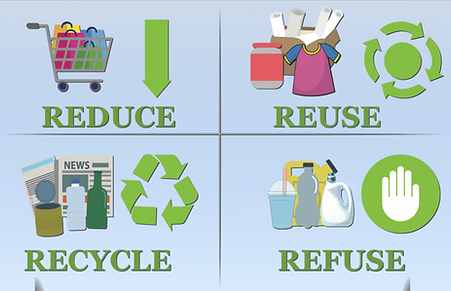
Plastic
Discarded plastic - a BIG problem
The Big Plastic Count organised in May 2022 by Everyday Plastic and Greenpeace asked participants to count all the pieces of plastic they threw away in one week and calculated that UK households throw away approximately 96 billion pieces of plastic packaging a year. Unfortunately just 12% of this household plastic packaging waste is likely to be recycled at reprocessing facilities in the UK.
What about the rest - what happens to that?
17% is exported to other countries to deal with, creating environmental and human health crises.
A quarter ends up in landfill where it slowly degrades and releases toxins and microplastics.
46% is burnt in incinerators where it releases toxic gases and greenhouse gases which fuel the climate crisis.
What type of plastic is it?
The vast majority of plastic packaging that we throw away in the UK (83%) is food and drink packaging. Supermarkets have promised to reduce their plastic footprint but have not done so yet.
What about soft plastic?
Just over half of the pieces of plastic which we throw away are soft plastic. Soft plastic is notoriously difficult to recycle. Only 13% of Local Authorities collect it and even the supermarket recycling schemes do not always deal with it effectively.
What actions do they want the Government to take?
-
Step in to drive a transition to a circular economy built around materials that can be reused and recycled many times over
- Set a legally binding target to cut single-use plastic by 50% by 2025
-
Immediately implement a deposit return scheme for plastic bottles to encourage reuse
-
Introduce Extended Producer Responsibility so that companies cover the full cost of recycling and disposing of their packaging - and the litter it causes
-
Ban all plastic waste exports by 2025
-
Set an immediate moratorium on building new incinerators or upgrades of old ones
To read more about the results go to thebigplasticcount.com
Click on the following for our news articles about the plastic problem:
The Big Plastic Count 2022 results
Using less plastic
The Big Plastic Count results highlight the fact that we are using unnecessary amounts of plastic and discarding far too much of it. It is vital that we reduce the amount of plastic produced at source by turning off the plastic tap and rapidly transition to reusable packaging. Recycling is important but it is much better to reduce the amount of plastic and packaging we buy in the first place.
10 things we can all do
-
Identify products which can be bought loose or refilled and-
-
Take our own containers with us - shops nowadays are usually happy to put meat, fish, bakery and other items in containers provided by the customer
-
Take our own bags when we shop for loose fruit and vegetables
-
Look at a few of the worst offenders we buy and write to the suppliers asking them about their plans to change to non-plastic packaging
.jpg)

-
Avoid laminated packaging or other composite materials which seldom get recycled properly
-
Switch to tins or jars instead of plastic (ketchup etc)
-
Be sure to recycle properly – remove lids from glass bottles and jars, keep lids on plastic bottles, do not put polystyrene or black plastic or plastic bags in the recycling. Make sure containers and trays are clean and free from grease
-
Dispose of soft plastic separately, not in our recycling bins (see below)
-
Try to find and support inventive packaging solutions, such as seaweed
-
Contact us with your great ideas to share with everyone else on this website!
Recycling flexible plastic
Soft plastic is almost unavoidable when buying from supermarkets, but now most supermarkets will collect it for recycling in with their carrier bag collections. Soft flexible plastics include items such as plastic crisp packets, bread, cheese and pasta bags and chocolate or biscuit wrappers, plastic film lids on yoghurt pots, soft fruit punnets and ready meals.
Terracycle
Terracycle is an organisation which collects many different streams of plastic packaging. These range from hard plastic dental and cosmetic packaging to soft flexible plastic packaging. The soft plastic may be opaque and metallic-looking ie. biscuit and crisps and coffee and dishwasher wrappers, or transparent plastic such as bread bags and cheese wrappers. None of these soft plastics should ever go in your recycling bin.

The value of recycling this way is that the organisations who are responsible for the plastic packaging in the first place are able to pay money to Terracycle to collect their waste and then turn it into a useful product such as playground flooring or garden furniture. The person who collects it on behalf of Terracycle not only helps to protect the planet against plastic pollution but also earns a donation towards a charity of their choice for all their efforts.
Many of these streams can be recycled at Zero Carbon Guildford at the top of Guildford High Street https://www.zerocarbonguildford.org/terracycle